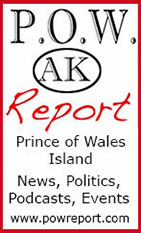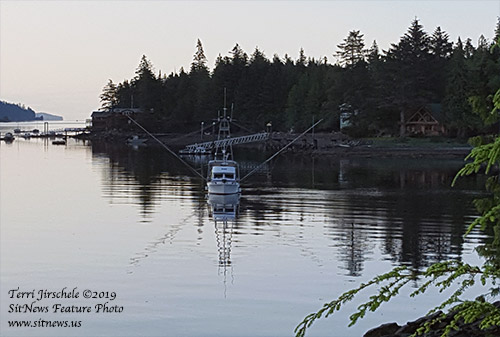




Weekly Specials
Online Shopping; Pickup or Delivery |
|












 Contact Contact 
 Webmail
Letters Webmail
Letters
 News Tips News Tips
 Copyright Info Copyright Info
 Archives Archives
Quick News
Search
 Alaska Alaska
 Ketchikan Ketchikan
 SE Alaska SE Alaska
Columns
- Articles
 Dave Kiffer Dave Kiffer
 Money Matters Money Matters
Historical
Ketchikan
 June Allen June Allen
 Dave
Kiffer Dave
Kiffer
 Louise
B. Harrington Louise
B. Harrington
Sports
 Ketchikan Links Ketchikan Links
Public Records
 FAA Accident Reports FAA Accident Reports
 NTSB
Accident Reports NTSB
Accident Reports
 Court Calendar Court Calendar
 Recent Filings & Case Dispositions Recent Filings & Case Dispositions
 Court Records Search Court Records Search
 Sex Offender Reg. Sex Offender Reg.
 Public Notices Public Notices
 Alaska Recall Alerts Alaska Recall Alerts
 Recalls.gov Recalls.gov
 AST Daily Dispatch AST Daily Dispatch
 KTN
Police Reports KTN
Police Reports
 Juneau Police Reports Juneau Police Reports
Weather,
Webcams
 Today's
Forecast Today's
Forecast
 KTN
Weather Data KTN
Weather Data
 AK
Weather Map AK
Weather Map
 AK Weathercams AK Weathercams
 AK Earthquakes AK Earthquakes

|
|

Monday
June 24, 2019

Reflections At Anchor
In Whiskey Cove, Pennock Island.
Front Page Feature Photo By TERRI JIRSCHELE ©2019
|
|
Alaska: House & Senate Leadership Announces 2nd Special Session to Meet in Juneau; Governor Says Negating the Special Session in Wasilla Has No Legal Basis By MARY KAUFFMAN - This afternoon, Alaska House and Senate leadership announced their intention to return to Juneau for the second special session set to begin on July 8th. In a news release from the House Speaker Bryce Edgmon (I-Dillingham) and Senate President Cathy Giessel (R-Anchorage), legislative leaders stated that they planned to ignore the location on the governor’s call to meet in Wasilla and instead convene away from the Mat-Su Valley.
The House Speaker and Senate President announced the Alaska Legislature will convene in Juneau on July 8th for the 2nd special session, with the majority of meetings to be held in Anchorage. Legislative leadership appears to have made this decision without garnering the approval of two-thirds of the legislature according to a statement from the Alaska House Republicans.
Governor Michael J. Dunleavy responded to the legislature’s to thwart the special session in Wasilla.
In a statement released this afternoon, Governor Dunleavy said:
“Our focus has been on bringing the people and legislature together on the PFD. But instead of convening in Wasilla, legislative leadership is attempting to retreat back to Juneau. This move to negate the special session in Wasilla has no legal basis. A governor is clearly empowered to call a special session in a location of their choosing (AS 24.05.100),” said Governor Dunleavy.
Governor Dunleavy said, “The Senate President and Speaker of the House admit they lack the votes to change the venue or call a special session of their own, yet they are committed to thwarting the law and the voice of the Alaskan people. This is all part of why Alaskans have lost trust in their lawmakers. How can we with a straight face expect people to follow the law when the legislative leadership ignores, breaks, and skirts the law at every turn?”
“The fact that legislative leadership plans to run away from the Mat-Su Valley back to their hiding places in Juneau is extremely illuminating,” said Rep. Lance Pruitt (R-Anchorage), House Minority Leader. “The legislative leadership has already tried to have these conversations on the budget, PFD, and education in the dark back rooms of far-away Alaska; they haven’t found answers. Now, we should be having these conversations in full view of the public.”
“This is a slap to the face of every Alaskan who lives on the road belt, and especially those in the Mat-Su Valley who have prepared their lives and businesses to accommodate the legislature,” said Rep. Colleen Sullivan-Leonard (R-Wasilla). “Escaping to Juneau to deny a vast majority of Alaskans the opportunity to engage in the process in-person is unacceptable.”
In a joint statement released today, House Speaker Edgmonand Senate President Giessel said:
“Funding the 2019 Permanent Fund dividend is critical to Alaskans. However, the long-term issues about the sustainability and future of the Permanent Fund must also be addressed. Unfortunately, the Governor’s special session proclamation restricts discussion solely to the amount of this year’s PFD.
“Funding the 2019 Permanent Fund dividend is critical to Alaskans. However, the long-term issues about the sustainability and future of the Permanent Fund must also be addressed. Unfortunately, the Governor’s special session proclamation restricts discussion solely to the amount of this year’s PFD.
“Importantly, the Governor’s proclamation also fails to include the Fiscal Year 2020 capital budget. If the capital budget is not finalized in July, Alaska’s private sector industries could be devastated by forfeiting nearly $1 billion in federal highway and aviation projects because required state matching dollars were not provided. - More...
Monday PM - June 24, 2019
|
|
Fish Factor: Alaska fishing boats, barges, tenders, sports charters: You are lawbreakers under a new rule few know about! By LAINE WELCH - A well-intended new Alaska law has gone awry from a botched roll out that has turned thousands of Alaskan fishing vessel, tender, barge and sport fish operators into lawbreakers.
Since the start of 2019, all vessels over 24 feet are required to be registered with the State at a Department of Motor Vehicles office. Previously, vessels that were documented with the US Coast Guard were not also required to register with the state. The registration costs $24 and is good for three years.
“You need to get down to the DMV whether you’re documented or not,” explained Frances Leach, executive director of United Fishermen of Alaska . “If you’re documented you have to register, and if you’re not documented, you have to register and get a title.”
The new rule stems from Senate Bill 92 , the Derelict Vessels Act introduced last year by Senator Peter Micciche (R-Soldotna) and passed by the legislature. It is intended to help harbor masters and others track down owners of abandoned vessels.
But virtually no mariners know about the new registration requirement.
“We found out about it from a DMV personnel in Haines who told one of our gillnetters and he told me, and we both called the troopers and they didn’t know anything about it,” said fisherman Max Worhatch of Petersburg. “Later they got back to us and said it was indeed the law.”
Worhatch, who is executive director of United Southeast Alaska Gillnetters, said he’s directed queries to the Departments of Administration and Public Safety.
“Why weren’t we notified?” he asked. “Nobody found out about this and nobody would’ve found out about this if we hadn’t alerted people. There was no public notice, nothing.”
The new law states that a derelict vessel prevention program shall, to the extent that general funds are available, establish education and community outreach programs. But the only outreach is coming from fishermen’s groups, said UFA’s Leach in a June 18 letter to Dept. of Administration Commissioner Tshibaka.
“Since becoming aware of this new law in late May, UFA has been working with the Department of Motor Vehicles and State Wildlife Troopers to understand how they intend to implement the requirements of the law,” the letter says. “We have notified thousands of fishermen of the law’s requirements through emails and social media posts. As far as we can tell, the commercial fishing industry, spearheaded by UFA, is the only sector actively working to inform commercial fishermen of the new requirements, even though this affects thousands of non-commercial fishing boat owners around the state. Who is informing them?”
It adds,“As fishermen attempt to comply with the law’s requirements they are discovering that many DMV offices are not ready to deal with the onslaught of this new bill.”
Leach and Worhatch also point out that requiring vessel registration at a DMV adds an unnecessary layer of bureaucracy and is “reinventing the wheel.”
“All the information on the DMV registration is available on a public database website at the Commercial Fisheries Entry Commission website. Everything,” said Worhatch.
UFA, which represents 36 fishing groups, requests a one year delay of the law “until all state agencies are better prepared and trained and adequate public notice and education are given prior to it going into effect.”
That has the support of Representative Jonathan Kreiss-Tomkins (D-Sitka).
“Running the DMV gauntlet is the last thing fishermen need to be thinking about as salmon season heats up,” he said by email.
Kreiss-Tomkins voted against the new law, saying he was concerned that the bill, albeit well intentioned and addressing all too real a problem, would create more paperwork than it would solutions. “The fear about paperwork headaches is proving all too real,” he said, adding that it “makes heaps of sense” for the existing CFEC database to do “double duty” and relieve the DMV of those headaches.
“If sound legislation will be forthcoming to this end, I'll certainly support it,” he said.
As to the botched rollout, Kreiss-Tomkins said: “There seems to be critical mass concern. Everyone — the fishermen, the agencies — is climbing a learning curve, so to some extent it's understandable. I just hope that this recent attention can help everyone get on the same sheet of music.” - More...
Monday PM - JUne 24, 2019
Alaska: Coast Guard in Alaska urges public to immediately report vessels adrift - The U.S. Coast Guard urges the boating public of Alaska to immediately call the Coast Guard in the event that a vessel is missing, floats away, or is suspected to be adrift.
The Coast Guard has observed that during the summer months an increased number of boats, especially canoes, dinghies and kayaks, are swept away by incoming tides. There are areas in Alaska that can experience 30-foot daily tidal fluctuations, and even high and low tides can fluctuate significantly.
Boaters are encouraged to properly secure their boats prior to leaving them unattended. In the event boaters find their boats missing, do not hesitate to notify the District 17 Command Center at 907-463-2000 to report the missing vessel.
"We ask the public to be vigilant about securing their boats, but to be equally vigilant about letting us know when a boat accidentally drifts away," said Cmdr. Mark Kuperman, deputy sector Commander for Coast Guard Sector Anchorage. "If we receive a report of a boat adrift with no one aboard, we presume the boater may now be in the water, needs help, and we go out searching. In the instance where a vessel has simply drifted away from its owner, our resources are then taken away from responding to people who may truly be in distress." - More...
Monday PM - June 24, 2019 |
|
Ketchikan Historical: Tragic laundry fire killed three during WWII ; Coast Guardsmen were staying in building that had been taken from Japanese internee By DAVE KIFFER - Hundreds of stories of servicemen and woman dying in combat in World War II have been passed down in the past 75 years.

Ken Pifer, one of three USCG servicemen killed in the fire.
Photograph Courtesy Diane Wilkins© |
But not all the deaths in the war took place in combat. One of the largest losses of life in Ketchikan during World War II took place in a laundry near the intersection of Mission and Stedman streets.
Three Coast Guardsmen, part of the large number of servicemen in the community during the war, died in the early morning hours. They were Kenneth L. Pifer, apprentice seaman, Leonard N. Olsson, apprentice seaman, and Pempillo Villanueva, officers steward.
They were living in a dormitory the Coast Guard had requisitioned because there wasn't enough on-base housing during the War. The building had been the Young American Laundry prior to the war.
The fire broke out in the early morning hours on April 8, 1943, according to the Ketchikan Chronicle.
"The flames made such headway by the time they were discovered that those arriving on the scene had little hope for saving the adjoining buildings," the Chronicle reported in its afternoon edition later in the day. "The Rev. James Hall in the adjacent Presbyterian Church Building turned in the alarm at 3:40 am this morning when he was aroused by the shouts of those in the burning building."
The Chronicle noted that 40 people were living in the three buildings at the time.
"Six of the men living over the laundry, their only other avenue of escape cut off, jumped from the rear windows to the creek bed below, flooded by high tide," the newspaper reported. "Four of the men swam to the other side and the two others came to the beach on the side under the flaming buildings. Flames and sparks shot high into the air illuminating the sky and reflecting on buildings blocks away."
The Chronicle reported that officials believed the fire started on the ground floor of the building in a "drying room."
"It may have a short circuit or boiler explosion," 'the newspaper reported. "One of the victims is believed to have sacrificed his life attempting to warn others of the fire as he was dashing through the building awakening fellow service men when he was last seen alive."
The Chronicle reported that, in addition to the three fatalities, three servicemen were severely injured in the blaze, two suffering burns and one suffering smoke inhalation. Meanwhile the building next to the laundry was also destroyed by the fire and two other buildings, including the Presbyterian Church were significantly damaged.
The building where the fire broke out had been renovated by the Coast Guard several months previously. - More...
Monday PM - June 24, 2019 |
COREY D. B. WALKER: Maryland 'Peace Cross' ruling: The Supreme Court rules that a cross stands for more than Christianity - The Supreme Court ruled on June 20 that a war memorial in Maryland in the shape of a Christian cross can stay on public land. The Bladensburg Peace Cross is a 40-foot cross erected as a memorial for those who died in service during World War I.
In a complex 7-2 ruling, the Supreme Court held that “the Bladensburg Cross does not violate the Establishment Clause” of the Constitution.
Writing for the majority, Justice Samuel Alito concluded, “The cross is undoubtedly a Christian symbol, but that fact should not blind us to everything else that the Bladensburg Cross has come to represent.”
Justices Ruth Bader Ginsburg and Sonia Sotomayor dissented. Justice Ginsburg argued, “The principal symbol of Christianity around the world should not loom over public thoroughfares, suggesting official recognition of that religion’s paramountcy.”
Experts believed the case could have far-reaching ramifications.
Constitutional law scholar Garrett Epps, for example, has noted that the case could “help resolve disputes over local memorials around the country.”
The case underscores the ongoing conflict over the place of religion in American public life. As a scholar who studies this debate, I believe it is important to understand the history of such conflicts and how symbols can have more than one meaning in a diverse society.
History of the memorial
To highlight these different meanings, let’s consider the history of the Bladensburg Peace Cross.
The memorial sits on public land, at the center of a busy intersection in Prince George’s County, in Maryland.
In 1919, a local group of citizens, including 10 mothers who lost their sons in World War I, formed the Prince George’s County Memorial Committee. Together with the Good Roads League of Prince George’s County, they launched an effort to memorialize those who died in service during the war. In 1922, American Legion Post 3 volunteered to join the effort to build the memorial. - More...
Monday PM - June 24, 2019
|

Political Cartoon: Reparations
By Gary McCoy ©2019, Shiloh, IL
Distributed to paid subscribers for publication by Cagle Cartoons, Inc. |
Peace Cross Ruling By
A.M.Johnson - Be the subject a 'Tree Topper' representing Christianity on a Community (Christmas) tree on Government property or the 'Bladensburg Peace Cross' honoring those who died in World War 1, both are First Amendment issues.
The Supreme Court recently rejected a challenge brought by atheist associations against the cross.
In today's hypersensitive, politically-correct couture, many people with nothing better to do walk around being offended on a daily basis. - More...
Monday PM - June 24, 2019
Old Dairy Road Service Area By
Agnes Moran - On May 7, 2019, WISH received by email the Old Dairy Road service area petition and a bid for road repairs. The way the documents were presented, it appeared that WISH would be responsible for $4000 in road repairs if the service area went forward. The description in the bid indicated that the only section of the road that was to be repaired was the portion adjacent to the properties of the individuals that had signed off on the petition. The repairs did not seem to address the issues with the road adjacent to the WISH property. WISH asked for additional information on the petition and the road repair bid and received no response.
At the onset of the June 17th Borough Assembly meeting, WISH was still under the impression that if the service area went forward, we would be on the hook for $4000 in road repairs of dubious value to WISH. Hence our request that the petition be rejected. It was only later in the public comment portion of the meeting that Mr. Hiatt indicated that he had abandoned the road repair scheme.
WISH has dutifully paid their property taxes on the parcels to date. We will continue to pay the base taxes and the approximately $400 (not $4000) in additional taxes levied if the service area is approved until we are utilizing the property in support of our mission. - More...
Thursday PM - June 20, 2019
Protecting Tribal Lands and Waterways for Future Generations By
Rob Sanderson Jr. - Indigenous peoples of British Columbia and Alaska, Washington, Idaho, and Montana are disproportionately affected by past, present, and proposed mines in Transboundary watersheds.
We have long voiced concern. All too often, actions such as mining benefit the up-stream country but create irreparable harm to the downstream country. International problems require international solutions. Some mechanisms are in place to resolve these disputes, such as the Boundary Waters Treaty of 1909 between Canada and the US. These mechanisms are being ignored.
British Columbia has allowed widespread pollution from mines to cross the border into Montana and are now proposing even larger mines in the headwaters above Alaska, threatening the last remaining wild salmon rivers in North America. Across the entire US border with BC, vital rivers and waters are being polluted or threatened by irresponsible mining practices in Canada. As the indigenous peoples who rely on these waters for our cultural identity and food security, we are both the experts and the first impacted.
Indigenous Nations are sovereign Nations predating and presaging many of the institutions of the US government. We have 1000’s of years of knowledge managing these watersheds as an intact whole.
To solve international problems requires Indigenous perspective and solutions. US Tribes/Clans and Canadian First Nations/Bands/Inuit/Metis must have seats at the decision table when it comes to huge industrial projects in the headwaters of vital watersheds that have the potential to devastate our communities. - More...
Thursday PM - June 20, 2019
Legislature Transfers Funds to the Permanent Fund Corpus By
Rep. Dan Ortiz - The Alaska State Legislature adjourned last week, but before adjourning, the most significant accomplishment was the agreement to transfer $10.5 billion from the Earnings Reserve Account (ERA) to the Corpus of the Permanent Fund. For the majority of legislators, including Senator Stedman and myself, it is a top priority to protect and enhance opportunities for the Permanent Fund to grow so that there will continue to be PFDs for Alaskans well into the future.
The Permanent Fund is comprised of the Corpus (also known as the Principal) and the ERA. The Corpus is non-spendable principal portion of the Permanent Fund; it can only be used for income-producing investments. The ERA is spendable, meaning it is available for appropriations as determined by the Legislature.
As of April 30th, the total value the Permanent Fund was 65.3 billion, with $19 billion in the ERA and $46.3 billion in the Corpus. The transfer of $10.5 billion from the ERA to the “permanent” portion of the fund will make it more likely that the Fund’s total value may reach $100 billion within the next 15 years. There will be a 5.25% draw on the total value of the Permanent Fund itself (based on statute SB26) to pay for the distribution of the PFD and pay for a portion of state services, which will bring the ERA value to approximately $16 billion, not including the agreed upon transfer.
In order to preserve the long-term value of the Permanent Fund, the non-partisan Legislative Finance Division and the Permanent Fund Corporation both recommend that the ERA draw is not larger than the 5.25% called for in statute. Larger unplanned draws would force the Permanent Fund Corporation to change the investment strategies for a significant portion of the fund away from long term high yield investments to short term cash flow-based investments. That would mean less growth potential for the fund itself. - More...
Thursday PM - June 20, 2019
Email letters, opinions, OPEDs to editor@sitnews.us
|
Articles &
photographs that appear in SitNews may be protected by copyright
and may not be reprinted or redistributed without written permission
from and payment of required fees to the proper sources.
E-mail your news &
photos to editor@sitnews.us
Photographers choosing to submit photographs for publication to SitNews are in doing so, granting their permission for publication and for archiving. SitNews does not sell photographs. All requests for purchasing a photograph will be emailed to the photographer.
|
|
















The Local Paper is
available online.
Click here for this week's printed edition (PDF)


|
|

![]() Contact
Contact ![]()
![]() Webmail
Letters
Webmail
Letters![]()
![]() News Tips
News Tips![]()
![]() Copyright Info
Copyright Info![]() Archives
Archives![]() Alaska
Alaska![]() Ketchikan
Ketchikan![]() SE Alaska
SE Alaska![]() Dave Kiffer
Dave Kiffer![]() Money Matters
Money Matters ![]() June Allen
June Allen![]() Dave
Kiffer
Dave
Kiffer![]() Louise
B. Harrington
Louise
B. Harrington ![]() Ketchikan Links
Ketchikan Links![]() FAA Accident Reports
FAA Accident Reports ![]() NTSB
Accident Reports
NTSB
Accident Reports![]() Court Calendar
Court Calendar![]() Recent Filings & Case Dispositions
Recent Filings & Case Dispositions ![]() Court Records Search
Court Records Search![]() Sex Offender Reg.
Sex Offender Reg.![]() Public Notices
Public Notices![]() Alaska Recall Alerts
Alaska Recall Alerts![]() Recalls.gov
Recalls.gov![]() AST Daily Dispatch
AST Daily Dispatch![]() KTN
Police Reports
KTN
Police Reports![]() Juneau Police Reports
Juneau Police Reports ![]() Today's
Forecast
Today's
Forecast![]() KTN
Weather Data
KTN
Weather Data![]() AK
Weather Map
AK
Weather Map![]() AK Weathercams
AK Weathercams![]() AK Earthquakes
AK Earthquakes





































